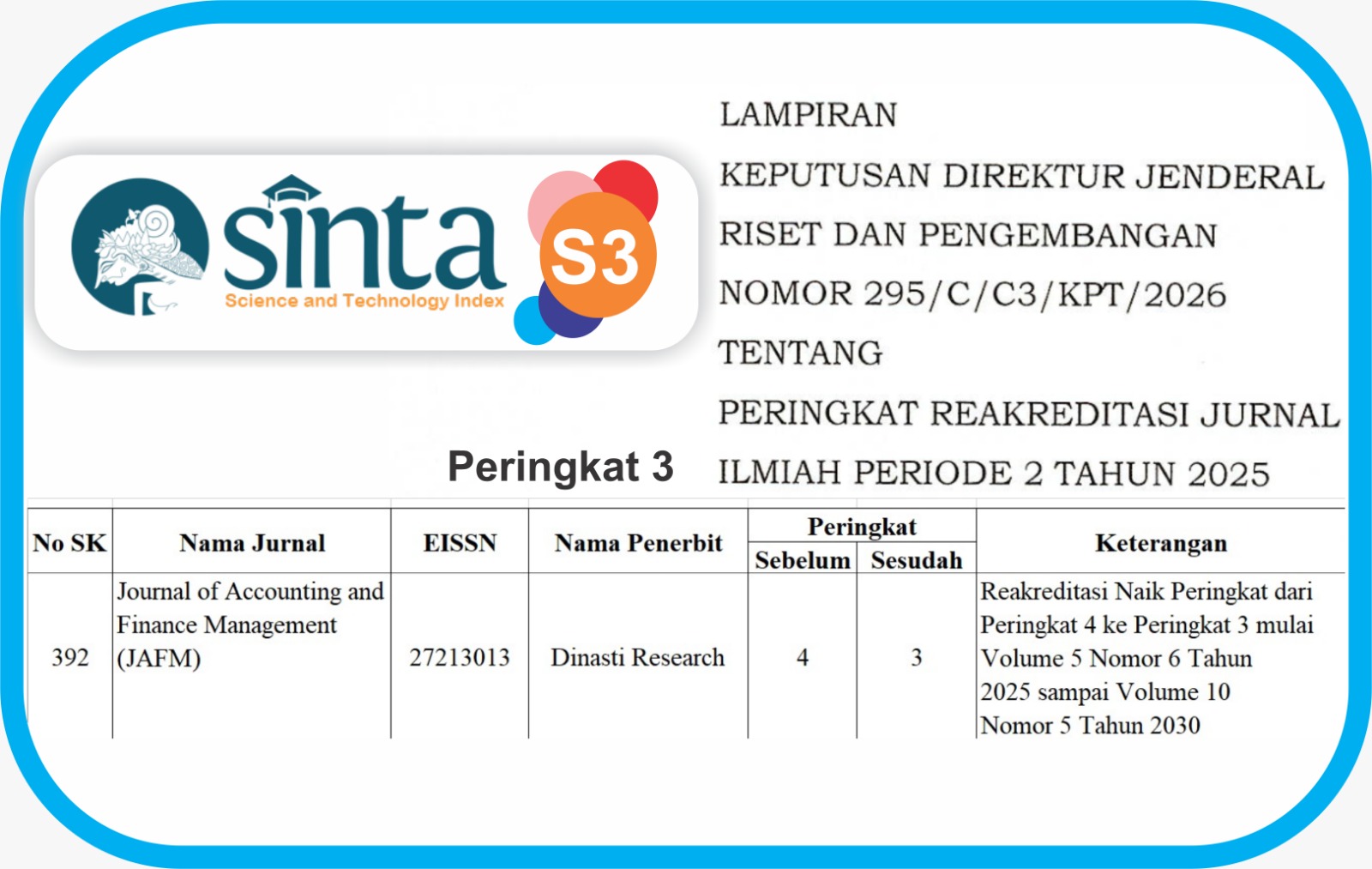Neo-Integrated Islamic Market Justice (Neo-IIMJ): Paradigma Baru Pasar Berkeadilan dalam Ekonomi Islam
DOI:
https://doi.org/10.38035/jafm.v6i5.2574Keywords:
Pasar Islami, Keadilan Ekonomi, Neo-IIMJ, Ekonomi Islam, Maqāṣid al-Syarī‘ahAbstract
Penelitian ini bertujuan untuk merekonstruksi teori pasar Islami melalui pengembangan model Neo-Integrated Islamic Market Justice (Neo-IIMJ) sebagai paradigma baru dalam ekonomi Islam. Model ini disusun dengan memadukan pemikiran ekonomi Islam klasik dan kontemporer yang menempatkan keadilan, etika, dan kemaslahatan sebagai fondasi utama pasar. Pendekatan ini mengintegrasikan enam dimensi analisis, yaitu normatif, positif, institusional, moral-epistemik, struktural, dan preskriptif. Kajian ini menggunakan metode penelitian kepustakaan (library research) dengan pendekatan kualitatif deskriptif. Sumber data terdiri atas literatur klasik seperti karya Abu Yusuf, al-Mawardi, al-Ghazali, Ibn Taymiyyah, Ibn Khaldūn, dan al-Syaṭibi, serta literatur kontemporer dari al-Ṣadr, Chapra, dan Kahf. Hasil kajian menunjukkan bahwa Neo-IIMJ menawarkan kerangka integratif yang menyeimbangkan antara efisiensi pasar dan keadilan sosial dengan berlandaskan maqaṣid al-syari‘ah. Model ini relevan untuk menghadapi tantangan ekonomi global modern, khususnya dalam mewujudkan pasar yang adil, transparan, dan berkelanjutan. Temuan penelitian ini memberikan kontribusi teoretis terhadap pengembangan epistemologi ekonomi Islam dan kontribusi praktis bagi perumusan kebijakan publik yang berorientasi pada kesejahteraan sosial dan keadilan ekonomi.
References
Abu Yusuf. (n.d.). Kitab al-Kharaj. Beirut: Dar al-Ma‘rifah.
Al-Ghazālī, A. H. (2005). Iḥyāʾ ʿUlūm al-Dīn. Beirut: Dar al-Kutub al-‘Ilmiyyah.
Al-Khasawneh, A., Al-Debei, M., & Al-Jaafreh, A. (2022). Ethical foundations of Islamic market and economic justice: A maqasid-based framework. Journal of Islamic Marketing, 13(4), 933–952. https://doi.org/10.1108/JIMA-08-2021-0247
Al-Māwardī, A. H. (1996). Al-Aḥkām al-Sulṭāniyyah wa al-Wilāyāt al-Dīniyyah. Beirut: Dar al-Kutub al-‘Ilmiyyah.
Al-Ṣadr, M. B. (1982). Iqtisaduna. Beirut: Dar al-Ta‘aruf.
Al-Syaṭibī, A. I. (1997). Al-Muwāfaqāt fī Uṣūl al-Syarī‘ah. Beirut: Dār al-Kutub al-‘Ilmiyyah.
Auda, J. (2008). Maqasid al-Shariah as philosophy of Islamic law: A systems approach. London: The International Institute of Islamic Thought (IIIT).
Chapra, M. U. (1992). Islam and the economic challenge. Leicester, UK: Islamic Foundation.
Chapra, M. U. (2008). The Islamic vision of development in the light of maqasid al-shariah. Jeddah: Islamic Research and Training Institute (IRTI), Islamic Development Bank.
Creswell, J. W., & Poth, C. N. (2018). Qualitative inquiry and research design: Choosing among five approaches (4th ed.). Thousand Oaks, CA: Sage Publications.
Creswell, J. W., & Poth, C. N. (2018). Qualitative inquiry and research design: Choosing among five approaches (4th ed.). Sage Publications.
Fauzi, A., & Nasution, M. E. (2021). Islamic market justice and socio-economic balance in the contemporary economy. Indonesian Journal of Islamic Economics, 7(2), 101–118. https://doi.org/10.20885/ijie.vol7.iss2.art3
Haneef, M. A. (2011). Contemporary Islamic economic thought: A selected comparative analysis. Kuala Lumpur: International Islamic University Malaysia Press.
Hasan, R., & Ali, M. (2020). Integrating moral economy and market ethics in Islamic perspective. International Journal of Ethics and Systems, 36(3), 397–412. https://doi.org/10.1108/IJOES-01-2020-0005
Ibn Khaldūn, A. R. (2005). Al-Muqaddimah. Beirut: Dār al-Fikr.
Ibn Taymiyyah, T. (2005). Majmūʿ al-Fatāwā (Vol. 28). Riyadh: Dar al-Wafa.
Iqbal, Z., & Mirakhor, A. (2017). Ethical dimensions of Islamic finance: Theory and practice. New York: Palgrave Macmillan.
Kahf, M. (1999). The Islamic economy: Analytical study of the functioning of the Islamic economic system. Jeddah: Islamic Research and Training Institute (IRTI).
Kahf, M. (2003). Islamic economics: What went wrong? Jeddah: Islamic Development Bank.
Miles, M. B., Huberman, A. M., & Saldaña, J. (2018). Qualitative data analysis: A methods sourcebook (4th ed.). Thousand Oaks, CA: Sage Publications.
Miles, M. B., Huberman, A. M., & Saldaña, J. (2018). Qualitative data analysis: A methods sourcebook (4th ed.). Sage Publications.
Razaq, A. (2019). Institutional integrity and ethical behavior in Islamic financial markets. Journal of Islamic Accounting and Business Research, 10(5), 712–728. https://doi.org/10.1108/JIABR-04-2018-0059
Siddiqi, M. N. (2014). The economic enterprise in Islam. Leicester, UK: Islamic Foundation.
Wahyudi, M., Yusuf, D., & Karim, A. (2023). Reconstructing Islamic market regulation through maqasid al-shariah. Jurnal Ekonomi dan Bisnis Islam, 9(1), 45–62. https://doi.org/10.21009/jebi.v9i1.3456
Wartoyo, W., Lutfiyanti, L., & Ainun, A. S. (2024). Analysis of monetary strategies and policies to manage the inflation and public purchasing power in Indonesia. Jurnal Ekonomi Syariah, Akuntansi dan Perbankan (JESKaPe), 8(1), 1–23. https://doi.org/10.52490/jeskape.v8i1.2526
Wartoyo. (2024). Transformasi nilai-nilai filosofis ibadah dalam ekonomi syariah. Nizham Journal of Islamic Studies, 6(2), 111–128.
Downloads
Published
How to Cite
Issue
Section
License
Copyright (c) 2025 Febri Delmi Yetti, Wartoyo Wartoyo

This work is licensed under a Creative Commons Attribution 4.0 International License.
Authors who publish their manuscripts in this journal agree to the following conditions:
- The copyright on each article belongs to the author(s).
- The author acknowledges that the Journal of Accounting and Finance Management (JAFM) has the right to be the first to publish with a Creative Commons Attribution 4.0 International license (Attribution 4.0 International (CC BY 4.0).
- Authors can submit articles separately, arrange for the non-exclusive distribution of manuscripts that have been published in this journal into other versions (e.g., sent to the author's institutional repository, publication into books, etc.), by acknowledging that the manuscript has been published for the first time in the Journal of Accounting and Finance Management (JAFM).



























